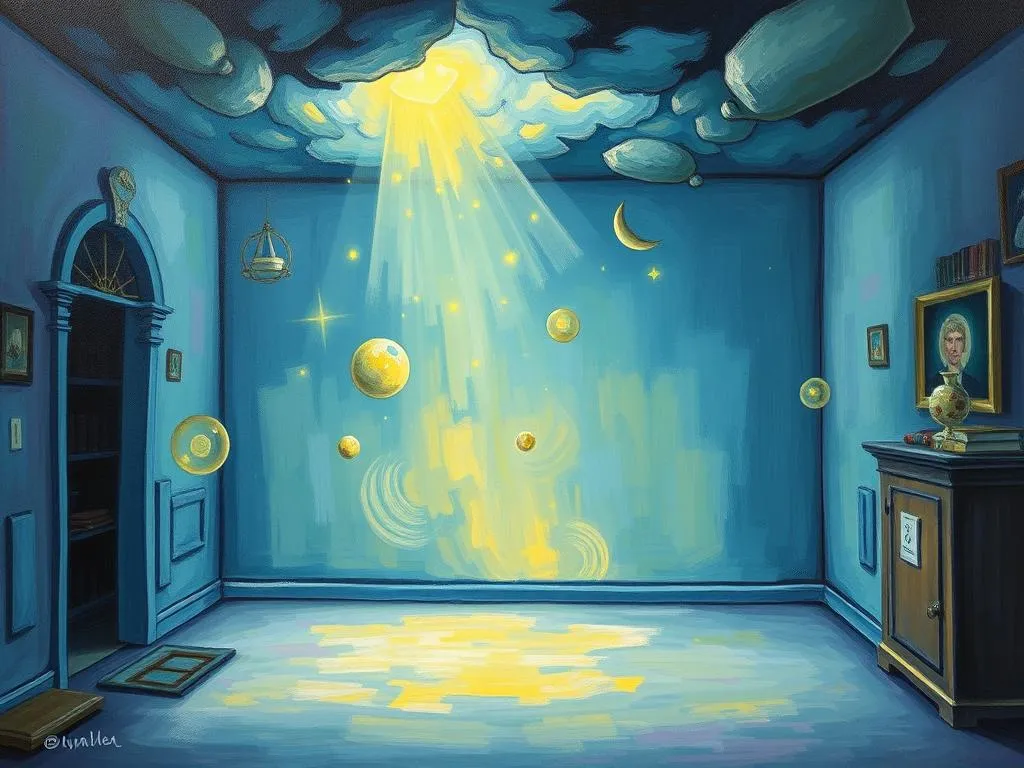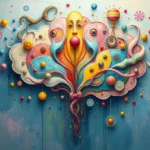
Introduction
Dreams have long fascinated humanity, serving as a window into our subconscious mind. Among the myriad of dream experiences, dark room dreams hold a peculiar allure that intrigues many. These dreams often evoke feelings of uncertainty, fear, and curiosity, prompting individuals to seek understanding of their underlying meanings. The concept of a dark room in dreams can symbolize various emotional states, personal experiences, or unresolved issues. By exploring the symbolism inherent in these dreams, we can unveil the secrets they hold and gain insight into our waking lives.
Symbolism and Meaning
The dark room is a multifaceted symbol that can represent various aspects of the dreamer’s psyche. At its core, this symbol often embodies feelings of fear, uncertainty, or the unknown. The darkness in a room can evoke a sense of being trapped or lost, mirroring the dreamer’s feelings in their waking life.
From a psychological perspective, the dark room may signify repressed emotions or aspects of oneself that are hidden from view. This can include fears, insecurities, or even desires that the dreamer has not fully acknowledged. When we find ourselves in a dark room within a dream, it may be our subconscious urging us to confront these hidden elements. In this sense, the darkness serves as a metaphor for our inner struggles, highlighting the need for self-discovery and acceptance.
Conversely, the dark room can also represent a safe space for introspection. In the absence of external distractions, the dreamer may find it easier to explore their thoughts and feelings. This interpretation emphasizes the importance of solitude and reflection in personal growth. Here, the darkness is not merely a source of fear but also a canvas for self-exploration and understanding.
Moreover, the presence of light within the dark room can shift the interpretation significantly. If there is a source of light illuminating the space, it may symbolize hope, clarity, or a path toward understanding. The interplay between light and darkness in the dream can reflect the dreamer’s journey toward self-awareness and acceptance.
Key Scenarios and Variations
The context of a dark room dream can drastically alter its interpretation. For instance, if the dreamer feels trapped in the dark room, this could indicate feelings of confinement or a lack of control in their waking life. It may suggest that they are grappling with a situation that leaves them feeling powerless. On the other hand, if the dreamer is able to navigate the dark room with ease, it may signify a sense of confidence in facing their fears or uncertainties.
Another common scenario involves the presence of others in the dark room. If the dreamer is alone, it could highlight feelings of isolation or the need for self-reflection. However, if there are other people present, this may symbolize external pressures or influences that contribute to the dreamer’s feelings of confusion or fear. The dynamics within the dream can reveal how the dreamer perceives their relationships and the impact they have on their emotional state.
In some instances, the dark room may be contrasted with a sudden exit or a door leading to light. This scenario often represents the dreamer’s desire to escape from their current emotional challenges. It can signify hope and the possibility of resolution, encouraging the dreamer to take proactive steps toward change. The presence of an exit may be a call to action, urging the dreamer to face their fears head-on rather than remaining stagnant in a state of uncertainty.
Additionally, variations in the size and shape of the dark room can also influence the interpretation. A small, claustrophobic room may amplify feelings of anxiety and restriction, while a larger, more spacious dark room can evoke a sense of vast potential and unexplored possibilities. The dream’s physical environment can reflect the dreamer’s emotional landscape, providing insights into their current state of mind.
Real-Life Connections and Takeaways
Understanding the symbolism of dark room dreams can offer valuable insights into real-life situations. To connect these dreams to your waking life, consider reflecting on any current challenges or emotions you may be facing. Are there aspects of yourself that you have been avoiding? Are you experiencing feelings of isolation or confusion? Taking the time to journal about your dreams and subsequent feelings can illuminate underlying patterns and themes in your life.
Self-reflection is a crucial part of interpreting dark room dreams. Consider the emotions you experienced during the dream and how they relate to your current circumstances. Were you afraid, calm, or curious? Each emotional response can provide clues to understanding your inner thoughts and feelings. For instance, if you felt a sense of dread in the dream, it may indicate unresolved fears that need addressing in your waking life. Conversely, if you felt a sense of peace, it may suggest that you are on the right path toward self-discovery.
Practical advice for navigating the feelings evoked by dark room dreams includes engaging in self-care activities that promote emotional well-being. This might involve setting aside time for meditation, journaling, or speaking with a trusted friend or therapist. These practices can help you process your thoughts and feelings, fostering a greater sense of clarity and understanding.
Moreover, consider the role of creativity in interpreting these dreams. Engaging in artistic expression, whether through painting, writing, or music, can serve as a powerful outlet for exploring the emotions tied to your dark room dreams. Creativity allows you to externalize and examine your feelings in a safe and constructive manner, ultimately leading to deeper insights.
Lastly, remember that dreams are deeply personal experiences. While common interpretations can provide guidance, it’s essential to trust your instincts and interpretations. Reflect on your unique life circumstances and emotional landscape, as these factors will play a significant role in the meaning of your dark room dreams.
Conclusion
Dark room dreams can be enigmatic and sometimes unsettling, yet they offer a rich tapestry of symbolism and meaning. By exploring the themes of fear, introspection, and self-discovery, we can glean valuable insights into our emotional lives. As you navigate your own dark room dreams, remember to approach them with curiosity and openness. Embrace the opportunity for self-reflection and growth, and don’t shy away from the shadows. Instead, seek to understand them, as they may reveal the secrets you need to uncover for your personal journey. In the end, it is through embracing the darkness that we often find the light.







